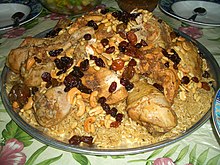Kabsa
 | |
| Course | Meal |
|---|---|
| Region or state | Arabian Peninsula[1] |
| Main ingredients | Rice (usually long-grain, almost always basmati), chicken, vegetables, and a mixture of spices (cardamom, saffron, cinnamon, black lime, bay leaves and nutmeg) |
| Variations | Machboos (Arabic: مكبوس/مچبوس, romanized: makbūs/machbūs) |
| |
Kabsa (Arabic: كبسة kabsah) or makbūs/machbūs (مكبوس/مچبوس Gulf pron.: [mɑtʃˈbuːs]) is an Arabian mixed rice dish that originates from Saudi Arabia[2] or Yemen.[1] It is commonly regarded as a national dish in all the countries of the Gulf Cooperation Council. It can also be found in regions such as southern Iran and Gaza in Palestine.[1]
History
Historically, kabsa was prepared by Bedouin tribes who roamed the deserts of the Arabian Peninsula. They relied on simple ingredients that were readily available: rice, meat (usually lamb or chicken), and a blend of spices.[2]
Over time, as trade routes expanded and new ingredients became accessible, variations of kabsa began to emerge.
Today, it is acknowledged that each region in Saudi Arabia has its own unique version of kabsa. Despite these differences, the essence remains—the combination of rice, meat and aromatic spices cooked together.[3]
Etymology
The name comes from the word kabasa (Arabic: كبس), literally meaning to press or squeeze, alluding to the technique used in the cooking where the ingredients are all cooked in (or "squeezed into") one pot.[citation needed]
Ingredients

These dishes, of which there are many variations, are usually made with rice (usually basmati), meat, vegetables, and a mixture of spices.
Pre-mixed kabsa spices are now available under several brand names. These reduce preparation time, but may have a flavor distinct from traditional kabsa. The spices used in kabsa are largely responsible for its taste; these are generally black pepper, cloves, cardamom, saffron, cinnamon, black lime, bay leaves and nutmeg.[4]
The main ingredient that accompanies the spices is the meat. The meats used are usually chicken, goat, lamb, camel, beef, fish or shrimp. In chicken machbūs, a whole chicken is used.[citation needed]
The spices, rice, and meat may be augmented with almonds, pine nuts, peanuts, onions, and sultanas.[5] The dish can be garnished with ḥashū (Arabic: حشو) and served hot with daqqūs (Arabic: دقّوس), which is a home-made Arabic tomato sauce.[citation needed]
 |
| Part of a series on |
| Arab cuisine |
|---|
Methods of cooking

Meat for kabsa can be cooked in various ways. A popular way of preparing meat is called mandi. This ancient technique originates from Hadramout[7] and involves a type of earth oven whereby meat is barbecued in a deep hole in the ground that is then covered while the meat cooks. Another way of preparing and serving meat for kabsa is mathbi, where seasoned meat is grilled on flat stones that are placed on top of burning embers. A third technique, madghūt, involves cooking the meat in a pressure cooker. All of these techniques originate from Yemen.[7]
See also
References
- ^ a b c Anissa Helou (4 October 2018). Feast: Food of the Islamic World. Bloomsbury. ISBN 9781526605566.
- ^ a b "Al Kabsa - Ancient Arabian Chicken and Fragrant Rice Recipe - Food.com". Food.com. 2022-05-27. Retrieved 2024-07-28.
This classic Arabian dish is Saudi Arabian in origin
- ^ Keliher, Irene (2023-09-27). "Kabsa: The Iconic Dish as Prepared in Saudi Arabia". Beyond Borders. Retrieved 2024-07-28.
- ^ "Al Kabsa - Traditional Rice dish". Food.com. Retrieved 23 June 2012.
- ^ "How to Make Kabsa". Retrieved 23 June 2012.
- ^ Salloum, Habeeb (2010). The Arabian nights cookbook : from lamb kebabs to baba ghanouj, delicious homestyle Arabian cooking. Suan I. Lim. Tokyo: Tuttle Pub. ISBN 978-1-4629-0524-9. OCLC 782879761.
- ^ a b Anissa Helou (4 October 2018). Feast: Food of the Islamic World. Bloomsbury. ISBN 9781526605566.
